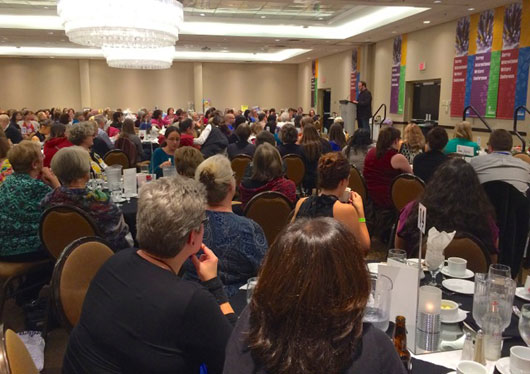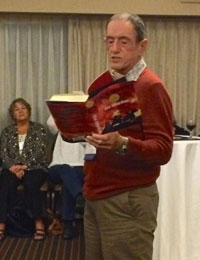Silk’s Post #106 — I’m still coming down from a three-day weekend up in the cloud where writers live. Sometimes that cloud is a lonely place. Sometimes it rains for weeks. Sometimes thunder and lightning make you want to crawl under your desk.
But at the Surrey International Writers’ Conference – #siwc2014 or #siwc14 – the sun is always shining when hundreds of writers and their gurus come out to play for three days every year. It rocks!
While I’ve been recovering (okay, the late nights in the bar and various social gatherings did have something to do with that), Joe has already done two excellent posts on his SIWC experience, and he only came for a day. I better get with the program.
This was my eighth SIWC. So here are a couple of fair questions:
- How come I keep going back – haven’t I been-there-done-that?
- How come I don’t have a book published by now?
First answer: I keep going back because every year I learn new stuff I need to know, and because it recharges my writing batteries, and because I’ve come to know and love the citizens of SIWC, and because it’s one of the best writers’ conferences in the world (even the big-dog presenters from New York say this).
Second answer: I don’t have a book published yet because I’m still a learner and I haven’t yet achieved a polished manuscript that’s ready to put in front of an agent or publisher. When I embarked on this second career after I wound up my design/advertising agency, I came to the party with 35 years of writing experience. I thought I’d be churning out a novel a year in no time. HAH! I must have missed the Steep Learning Curve Ahead sign when I turned onto that road. Oh, alright alright, my questionable post-retirement work habits and tendency toward procrastination does factor into it too.
That’s why I love the SIWC log line: This Day We Write! This came from a conference keynote a couple of years ago by bestselling author Robert Dugoni, who graciously let SIWC adopt it as their own. It’s the perfect rallying cry in this nebulous writers’ cloud we all live in, tucked away by ourselves most of the year, but connected to each other in a kind of virtual community.
This year at SIWC I attended one 3-hour Master Class, 4 keynotes, 3 panels, 5 workshops, 3 luncheons, 2 banquets, 1 agent pitch, 1 blue-pencil session, 1 theatrical presentation, 1 cocktail party, 1 book fair, and a late night book launch. Plus bar time.
Seriously, I really did need a day to recover.
I also took rather voluminous notes, and will share some of this rich trove in more detail in future posts, but today I want to give you my 10 top take-aways – some new things I learned, some things I thought I knew but now finally understand, and some things that just resonated with me.
1. Emotional impact trumps everything else in fiction. Story, setting, premise, characters, action, plot, voice, style, and subject are all important ingredients – but the real magic only happens if you can cause the reader to experience a powerful emotion. (Thanks to Don Maass for this insight from his Master Class “The Emotional Craft of Fiction.”)
2. To avoid obvious and clichéd emotional reactions in characters, evoke rather than report. We’ve all heard “show, don’t tell”. This is a kind of corollary. Make big emotions – the ones with a lot of gravity – like dark stars that affect everything around them without being overtly visible. (Inspiration by Don Maass, weird planetary analogy by me.)
3. A writer’s number one platform on the Internet is his/her own website. It’s the one thing in cyberspace that’s totally in your control, where you own the space and content. Think of it as the centre of your own online community. Use whatever social media and other channels you are comfortable with – and have time to keep up – to steer people to your website. (This point was driven home repeatedly by multiple social media experts, including two of the best: Sean Cranbury and Sarah Wendell.)
4. The most powerful social media tool a writer can use is (wait for it) … email. There are 3 times more email accounts than Twitter and Facebook combined. 92 per cent of adults use email, and 61 per cent of them use it every day. Email is 6 times more likely to get a click-through (to your website or blog) than a tweet, and 40 times more likely to generate new clients/relationships. (Thanks to Sarah Wendell for doing the math).
5. The 3 most important things that build your social media currency are: generosity, consistency and authenticity. Joe already mentioned this, but it’s so important that it can’t be said too many times. Social media are, first and foremost, about relationships and sharing – not marketing opportunities. Don’t be the person who only reaches out to others when you want something from them. Do more giving than receiving. If you support and share with people 90 per cent of the time, you get to talk about yourself 10 per cent of the time. What a surprise … cyber life is just like real life! (This theme was universally emphasized by experts Sarah Wendell, Sean Cranbury and Chuck Wendig in their “Social Media Smackdown” panel).
6. Characters drive story. Characters need to have agency. Active characters push the plot around, they don’t just get pushed around by the plot. Every character has to have a problem (a want) to be solved (fulfilled). In the gulf between the character’s problem and its solution is the story, which must wind its way from the problem to the solution through a minefield of complications. (While these principles have been repeated by many, in many different ways, Chuck Wendig in his “Kick-Ass Characters” workshop, brought terrific clarity and insight to these essential concepts).
7. To create tension, the writer has to walk a tightrope between withholding and revealing information to the reader. Tension occupies the space between what the writer allows the reader to know, and what the writer allows the character to know. The reader always needs to be slightly ahead of the character, which stimulates worry … but not so far ahead that the character seems slow-witted. (A great panel of suspense writers, Hallie Ephron, Robert Wiersema and Chevy Stevens illuminated this dark corner of writing in their discussion, “Tension: More Than the Edge of Your Seat”).
8. Planting questions makes readers turn pages. While this seems like the simplest and most obvious piece of advice in the writing world, it is a deliberate technique that’s hard to remember when you’re in the flow of writing, and easy to make too obvious when you strew questions around retroactively. The compelling need to know “what happens next” is the most delicious form of tension for the reader. (Another trick of the trade from the “Tension” panel).
9. Dialogue should only consist of things that need to be said, or are inherently interesting. Another seemingly obvious principle that gets wantonly violated by throwing all sorts of debris into dialogue such as backstory, pointless conversation meant to mimic “real life” and other content the author didn’t know what else to do with. (Thanks to Outlander author, Diana Gabaldon – the mistress of dialogue – for this reminder).
10. Read aloud. SIWC’s favourite Scottish icon, author Jack Whyte, is probably the best reader I’ve ever heard. With his rich baritone and dramatic flair, he can make the telephone book sound like gorgeous literature. Listening to him read the finely-crafted opening of his new book, The Guardian, at a special pre-release book launch on Saturday night, I was reminded of another excellent piece of advice that I’ve often received and always forget to do. Read your book to yourself out loud, especially key passages or dialogue that needs to be “just right” to the reader’s ear. It’s amazing how every awkward turn of phrase, bit of unnatural dialogue, misplaced word and run-on sentence will suddenly become obvious.
To wind this post up, I want to share the best word I heard at the conference, and its context:
Avoid online douchebaggery.




Love your posts (everybody). I learn from them. Still learning, learning. Thanks.
Elizabeth, thanks so much for the kind words. I/we certainly owe you a debt for all we’ve learned from you in your workshops and writing. Love it when sharing goes both ways!
Wow, thanks, Elizabeth! right back at ya!
Reblogged this on the bashful writer and commented:
I haven’t attended the Surrey International Writers Conference but I hope to one day be able to. In the mean time, here is some advice from a writer who’s blog I follow and who’s attended eight SIWC. Thanks for sharing what you learned! It is much appreciated!
Thanks, Alicia
Glad you enjoyed it Alicia, and I hope to see you at a future SIWC!
Thanks so much for your 10 pearls, Silk. I’ll download them and keep them in the research file I hope to use while actually writing my next story. I always need to be re-reminded of #1 & 2, and hope you don’t think I’ve violated #6 (been very busy, and haven’t been attending to several things I should have). Hope to get back to reading, and learning from, more 5×5 blogs
Reblogged this on sherriemiranda1 and commented:
I feel the same way about the La Jolla Writer’s Conference. This year was the best to date!
Pingback: 10 best things I learned at Surrey International Writers’ Conference | Ghostposts's Weblog